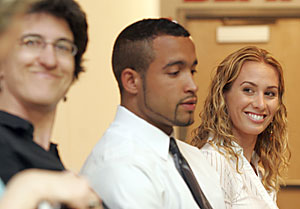 |
|
JAKE LACEY/Arizona Daily Wildcat
|
Media arts senior Chelsea Powell, right, participates in a panel discussion of her documentary on the issue of Title IX in collegiate sports with interdisciplinary studies senior Chris Harris, center, a running back on the football team. Powell interviewed fellow student-athletes and athletic department officials in her film to determine how Title IX affects UA sports.
|
|
|
By Troy J. Acevedo
Arizona Daily Wildcat
Wednesday, April 20, 2005
Print this
In an effort to help people better understand Title IX and how this affects the UA, a student-athlete created a film to better explain the regulation.
Chelsea Powell, a media arts senior and UA women's track and field hurdler, produced a documentary film depicting how the UA and schools nationwide have been affected by Title IX both positively and negatively.
Title IX is a controversial subject dealing with the distribution of funds between men's and women's athletic programs and has been the cause of several civil rights lawsuits, including a lawsuit regarding university wrestling programs claiming reverse discrimination, said Jim Livengood, athletics director.
Powell screened the film last night in the McKale Center Hillenbrand Auditorium to an audience of 130 students, faculty, staff and community members, with a panel discussion following.
"This film has really helped in accomplishing a goal: to understand Title IX and the complexity behind it," said Kevin Sandler, assistant professor of media arts and mentor for Powell's film.
The film began production in summer 2003 and was completed late 2004 and had its first public screening last night, Sandler said.
With the assistance of the media arts production laboratory and multimedia laboratory, expenses were kept to a minimum and limited to film and a few miscellaneous accessories used during production, Powell said.
"Everything for this project, I did by myself. From carrying equipment, setting up cameras, filming and editing, I kept at it," Powell said.
Several coaches from the UA athletics department were interviewed for the film. In order to obtain these interviews, Powell said she had to draft a letter explaining the project and have written release forms.
"Being an athlete, it really made the process easier," Powell said. "Mike Stoops was wonderful, he gave me the longest interview of all. Lute Olsen was tough to get in touch with because of his busy schedule."
Those interviewed explained Title IX is a regulation that universities must adhere to regarding equal treatment toward men's and women's athletics.
Powell said this was her first major production and she is still exploring various options for future uses of the documentary, including local public broadcasting or possibly a larger venue.
"I really think that this screening will give me a better idea of what I would like to do with the film and where I would like to take it," Powell said.
Livengood and Kathleen "Rocky" LaRose, senior director of athletics, were not only interviewed for the documentary, but were in attendance to support Powell's film as well.
"Title IX is a very easy subject to misunderstand. My experience with it goes back through three schools and two civil rights suits," Livengood said. "Chelsea did a phenomenal job at bringing to light an extremely difficult subject."
Issues regarding Title IX and the disbursement of funds between men's and women's athletics is still widely unknown and definitely easy to misconstrue, according to Powell.
"I feel from a football perspective that no team really receives more than another," said Chris Harris, a UA football senior. "Here at the UA we really try to make everything equal."
